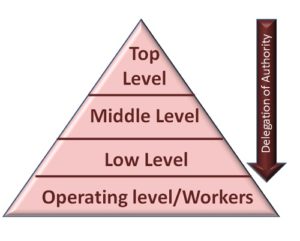Delegation of Authority: In any business organization, there are many employees working. They all have been assigned their own job to which they are accountable. Thanks to the principles of management, which provides the division of labour. It is very important to divide the work in the organization because a single person can not deal with all the work.
That is the reason why the work in divided and assigned to the person with the right ability to complete that work. These things are done in the staffing function of management.
But do you think just dividing the work and assigning it to the person with right qualification is enough?
If you think so then sorry to say but you are wrong. Because if the work is given but not authority is given to do that job then how will the employee complete that work?
So what do we need to do now?
We need to delegate the authority and give him some authority so that he can do that work without any difficulties. If you are looking for what is delegation of authority then you will find everything important about it.
Because in this article of mine, I will tell you about delegation of authority along with the advantages and disadvantages.
What is Delegation of Authority?
This topic is not too heavy so that we need to go in depth about it, the things are very simple and can be explained very easily.
The delegation of authority is nothing but assigning of work from top-level management to lower level management or from a superior to subordinate and giving that subordinate the authority to complete that job.
Here the term authority means the right to give orders to the subordinates or the people who are working under one employee and take decisions about the work.
Advantages of Delegation of Authority
We now know the what is delegation of authority now let us check out what are the advantages an organization will get by doing this.
- The employees get a feeling of belongingness.
- It will be easy for the employees to complete the work.
Disadvantages of Delegation of Authority
There are not many disadvantages of the delegation of authority. The only one we could find is that the employees may misuse the authority given to them.
Process of Delegation of Authority
The process includes the below-mentioned steps.
- Allocation of Duties
- Delegation of Authority
- Assignment of Responsibility
- Creation of Accountability
I have explained these 4 steps in the process below.
1) Allocation of Duties
Before the authority can be delegated to any of the employees it is important to allocate the duty to him. Because without any duty, what will he or she do with the authority? So this is the first step in the process.
2) Delegation of Authority
The work now has been given to the employee so now it is time to give him authority to complete that work. And it is very important to give him the authority.
3) Assignment of Responsibility
The authority and the responsibility both go hand in hand so when there is authority given to the employee it is equally important to assign the responsibility.
4) Creation of Accountability
After giving both authority and responsibility the employee should be accountable for the work. He or she whoever the employee is they should be answerable to the superiors. If in case something goes wrong with the work they should be answerable to the questions asked by the superiors.
Conclusion
So this was all about the delegation of authority and its process. I hope you are clear with all the information mentioned in this guide. But if you have any kind of doubts in your mind then you can comment down below.
